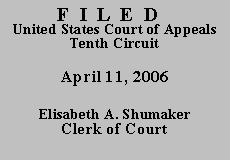 UNITED STATES COURT OF APPEALS
UNITED STATES COURT OF APPEALS
 UNITED STATES COURT OF APPEALS
UNITED STATES COURT OF APPEALS
| DENNIS DONNELL JONES, |
|
| v. | |
| MIKE MULLIN, Warden, |
|
Before EBEL, McKAY, and HENRY, Circuit Judges.
I. BACKGROUND
In June 2002, a jury convicted Mr. Jones of (1) one count of assault and battery with a deadly weapon with intent to kill, in violation of Okla. Stat. tit. 21 § 645; (2) forcible oral sodomy, in violation of Okla. Stat. tit. 21 § 888; (3) two counts of rape in the first degree, in violation of Okla. Stat. tit. 21 § 1111; (4) robbery with a dangerous weapon, in violation of Okla. Stat. tit. 21 § 888; (5) kidnaping, in violation of Okla. Stat. tit. 21 § 741; and (6) one count of assault and battery with a deadly weapon with intent to kill, in violation of Okla. Stat. tit. 21 § 645. The jury found that Mr. Jones had committed these offenses after he had previously been convicted of two or more felonies. The jury sentenced him to consecutive terms of imprisonment of 50 years, 25 years, 75 years, 75 years, 35 years, and 75 years, respectively. The Oklahoma Court of Criminal Appeals affirmed his convictions in August 2003, and on November 28, 2003, the ninety-day period expired for filing a petition for certiorari in the United States Supreme Court.
On November 12, 2004, Mr. Jones timely filed a petition for a writ of habeas corpus, pursuant to 28 U.S.C. § 2254, raising four grounds for relief. The magistrate judge recommended that the all claims should be dismissed because they lacked merit. The district court adopted the magistrate judge's report and recommendation with respect to all claims. Mr. Jones has narrowed his request for a COA to only one claim: that the trial court's failure to provide a jury instruction regarding parole eligibility violated his right to due process.
II. DISCUSSION
Issuance of a COA is jurisdictional. Miller-El v. Cockrell, 537 U.S. 322, 336 (2003). A COA may issue "only if the applicant has made a substantial showing of the denial of a constitutional right." 28 U.S.C. § 2253(c)(2). "A petitioner satisfies this standard by demonstrating that jurists of reason could disagree with the district court's resolution of his constitutional claims or that jurists could conclude the issues presented are adequate to deserve encouragement to proceed further." Miller-El, 537 U.S. at 327. "The COA determination under § 2253(c) requires an overview of the claims in the habeas petition and a general assessment of their merits." Id. at 336. "This threshold inquiry does not require full consideration of the factual or legal bases adduced in support of the claims. In fact, the statute forbids it." Id. While Mr. Jones is not required to prove the merits of his case in applying for a COA, he must nevertheless demonstrate "something more than the absence of frivolity or the existence of mere good faith on his or her part." Id. at 338 (internal quotation marks omitted).
Mr. Jones contends that he is entitled to re-sentencing because due process demands that a jury be informed that Oklahoma's parole eligibility requirements effectively require him to serve such a large portion of his sentence that there is no possibility of parole during his natural life. The magistrate judge recommended that this claim be denied because the trial court's refusal to give the requested jury instruction was "not contrary to or an unreasonable application of clearly-established Supreme Court jurisprudence, and the omission of a jury instruction on the issue of parole eligibility did not render [Mr. Jones's] trial fundamentally unfair." Rec. doc. 34, at 19 (Report and Recommendation, filed Apr. 28, 2005).
We have carefully reviewed Mr. Jones's brief, the district court's disposition, the magistrate judge's report and recommendation, and the record on appeal. For substantially the same reasons set forth in the magistrate judge's report and recommendation, we hold that Mr. Jones's application for a COA does not make "a substantial showing of the denial of a constitutional right." 28 U.S.C. § 2253(c)(2). We therefore GRANT Mr. Jones's motion to proceed in forma pauperis, but we deny his request for a COA and accordingly we DISMISS this appeal.
Entered for the Court,
Robert H. Henry
Circuit Judge